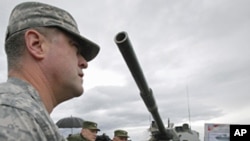The United States said Tuesday it is halting information-sharing with Russia under the treaty limiting conventional forces in Europe, the CFE. Moscow stopped providing information on its forces four years ago.
Officials here say the United States is suspending data exchanges with Moscow on conventional force deployments in Europe and will bar Russian inspectors from U.S. bases.
But they say the U.S. side will continue to observe weapons limits under the treaty, with the hope that Russia will at some point resume compliance and agree to update the Cold War-era agreement.
The original 1990 treaty limited the number of tanks, aircraft and other major non-nuclear weapons that NATO and the former Warsaw Pact could deploy west of Russia’s Ural mountains.
The 30 signatory countries updated the treaty in 1999 but NATO states refused to ratify it as long as Russia kept troops in Georgia and the breakaway Moldovan region of Trans-Dniester.
Russia began refusing to allow base inspections and provide weapons data in late 2007.
At a news briefing, State Department Spokeswoman Victoria Nuland said the United States is taking reciprocal action after Russia rebuffed attempts to update the treaty.
“We have tried repeatedly to bring Russia back to the table, because we do believe in the CFE and we think it provides reassurance," said Nuland. "But we’re at a stage now where, after a number of efforts to salvage this, we don’t think it’s in our interest to continue to provide data that is not reciprocated on the Russia side.”
Nuland said she expects NATO allies to follow the U.S. lead and limit CFE cooperation with Moscow, while saying the United States will continue information-sharing with all treaty countries except Russia.
Russia expert Ariel Cohen, a senior research fellow at Washington’s Heritage Foundation, says despite a much publicized “reset” of U.S.-Russian relations in 2009, tensions remain over various issues including U.S. missile defense plans for Europe.
“There are numerous issues," said Cohen. "And I think the conventional forces-Europe treaty - that we don’t want to cooperate with Russia now - is because the Russians suspended their membership in the CFE treaty, not giving us anything in return. And the U.S. is fed up. Now we’re not going to violate the parameters of the CFE treaty and beef up our conventional forces in Europe. Nor is there a reason for that.”
State Department Spokeswoman Nuland downplayed a suggestion the CFE dispute reflects a major setback in U.S.-Russian relations, saying the 2009 “reset” wasn’t expected to resolve all issues.
“The reset has allowed us to make significant progress on some very difficult issues: the conclusion of the new START [strategic arms reduction] deal, better understanding on Afghanistan, significant progress on Iran," she said. "But reset also allows us to speak quite frankly when we have difficulties and disagreements, as we’ve had on issues like the sovereignty of Georgia, etcetera.”
Nuland, who was involved in CFE negotiations before taking her current post, said the United States made two “extremely serious” efforts to settle differences with Moscow since 2007 and that the “door remains open” to a deal.
US Curbs Conventional Arms Cooperation With Russia




